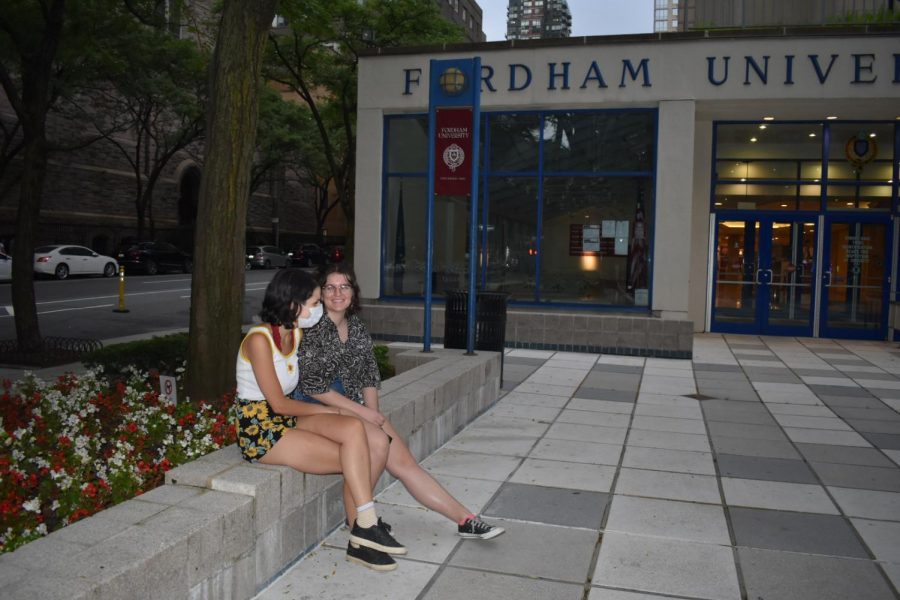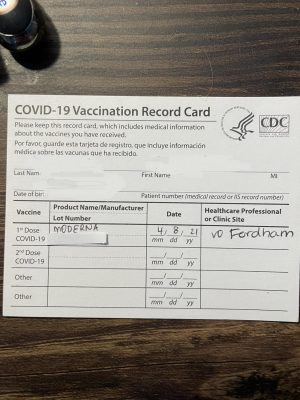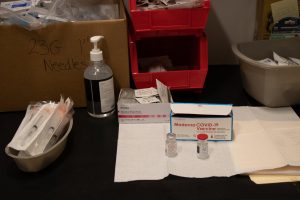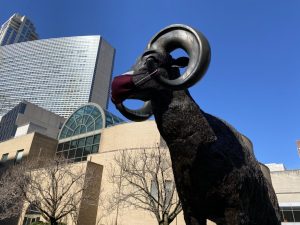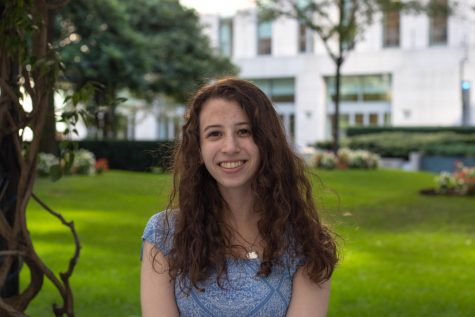Employee Town Hall Sheds Light on Fall Semester COVID-19 Protocol
Expectations for students, faculty and staff were addressed at a virtual town hall on June 23
Vaccinated students, while recommended to wear masks indoors, will no longer be required to do so.
August 4, 2021
Fordham’s decision to return to fully in-person operations for the fall 2021 semester has led to many questions and concerns raised by students, faculty and staff about what to expect. The Office of the Vice President held an Employee Town Hall on June 23 to discuss protocols for classes and campus life.
The meeting opened with a recollection of the rise and fall of COVID-19 cases in the U.S. and known routes of exposure. Shannon Magari, the epidemiologist contracted by Fordham, emphasized the importance of the hierarchy of controls that practitioners use to regulate workplace hazards.
Elimination — which involves physically removing the hazard — stands as most effective and is followed in decreasing effectiveness by substitution, engineering controls, administrative controls and personal protective equipment (PPE). Although the vaccine has aided in this process, COVID-19 has not yet been fully eliminated, which creates the need for succeeding defense systems.
Fordham will be working closely with VitalCheck to maintain a safe campus.
Substitution is the second most effective and it implies replacing the hazard with something less hazardous, or non-hazardous altogether. Engineering controls ensure that ventilation systems are safe, and that buildings offer appropriate partitions and signs reminding people to maintain social distance.
Administrative controls, on the other hand, involves ensuring social distancing, washing hands frequently and sanitizing shared surfaces. Personal protective equipment, such as masks and gloves, are necessary when other controls aren’t sufficiently effective. Since vaccination has made the road to elimination possible, PPE is not as necessary for those who are vaccinated.
Fordham will be working closely with VitalCheck to maintain a safe campus. Faculty, staff and students are expected to be fully vaccinated by August 1, with proof of vaccination uploaded to VitalCheck.
Those who are approved to be exempt from the vaccination requirement for religious or medical reasons will have to upload negative COVID-19 test results on a weekly basis and receive weekly reminders to get vaccinated through VitalCheck.
Religious accommodation can be requested by submitting a letter stating an individual’s “earnestly held religious belief against vaccination,” according to Kay Turner, vice president for human resources.
To receive medical accommodation, a request must also be submitted, however, according to Kay Turner, accommodations for people who live with high risk individuals will no longer be accepted.
“I’m confident that the university’s protocol to only allow students and faculty who are fully vaccinated to be in-person is the best way to go about things.”Peter Tan, professor of philosophy
An unvaccinated individual will be denied access to campus if they fail to upload their COVID-19 test results.
“I’m confident that the university’s protocol to only allow students and faculty who are fully vaccinated to be in-person is the best way to go about things,” Peter Tan, a professor of philosophy, said.
Others approach the upcoming semester with a sense of apprehension. As said by Anne Hoffman, a professor of English, “It’s hard to know what to say at this point about the return to fully in-person functioning in the fall, given the uncertainties that surround the Delta variant. While I recognize the value of in-person encounter in the classroom, my sense is that there will have to be some provision for remote instruction.”
Unvaccinated employees without approved accommodations will be placed on unpaid leave for the semester until the university learns more about COVID-19 and vaccination.
Vaccinated employees will not be required to submit weekly test results, wear masks, social distance or quarantine after domestic travel or close contact with a positive case.
Unvaccinated employees without approved accommodations will be placed on unpaid leave for the semester until the university learns more about COVID-19 and vaccination.
If a vaccinated employee tests positive, however, their absence during the 10-day quarantine period will be covered by Fordham.
Shannon Magari anticipates that even vaccinated people at Fordham will wear masks as flu season approaches just to prevent illness from the flu and common cold.
Speakers at the town hall were in unanimous agreement that being fully vaccinated and returning to pre-pandemic operations does not mean that people should stop being cautious and conscious of hygiene.
Fordham will be using air filters and cleaners, ensuring that heating, ventilation and air conditioning (HVAC) systems are running properly, and pumping 100% outside air through all buildings.
Shannon Magari anticipates that even vaccinated people at Fordham will wear masks as flu season approaches just to prevent illness from the flu and common cold.
Magari also emphasized the importance of wearing masks when using public transportation and visiting other high-density situations where it’s not necessarily known if surrounding people are vaccinated, as advised by the New York State Department of Health.

